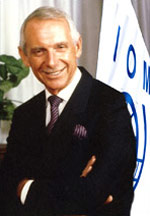International Organization for Migration (IOM)

"My vision for IOM is for a collaborative organization of professionals built on trust and one that listens to Member States and which efficiently and cost-effectively helps them manage migration to the benefit of all."
William Lacy Swing,
IOM Director General

On 18 June 2008, Ambassador William Lacy Swing of the United States was elected as the next Director General of the International Organization for Migration (IOM). He assumed his post on 1 October 2008.
Established in 1951, IOM is the leading inter-governmental organization in the field of migration and works closely with governmental, intergovernmental and non-governmental partners.
With 146 member states, a further 13 states holding observer status and offices in over 100 countries, IOM is dedicated to promoting humane and orderly migration for the benefit of all. It does so by providing services and advice to governments and migrants.
IOM works to help ensure the orderly and humane management of migration, to promote international cooperation on migration issues, to assist in the search for practical solutions to migration problems and to provide humanitarian assistance to migrants in need, including refugees and internally displaced people.
The IOM Constitution recognizes the link between migration and economic, social and cultural development, as well as to the right of freedom of movement.
IOM works in the four broad areas of migration management:
- Migration and development
- Facilitating migration
- Regulating migration
- Forced migration
IOM activities that cut across these areas include the promotion of international migration law, policy debate and guidance, protection of migrants' rights, migration health and the gender dimension of migration.
IOM’s office in Moscow was opened in 1992.
IOM’s activities in Russia are governed by a Cooperation Agreement between the Government of the Russian Federation and the International Organization for Migration, in the following areas:
- direct aid to migrants in the course of migration and integration in the new places of residence;
- emergency efforts to provide assistance to displaced persons in the Northern Caucasus;
- technical and expert assistance in migration management and development of legislation;
- improvement of border control and immigration control systems;
- efforts against human trafficking, including trafficking in women and children for sex exploitation;
- information campaigns to prevent irregular migration;
- return of third-country nationals who are in distress in Russia;
- research programs aimed at resolving migration problems;
- medical aid to migrants;
- assisted voluntary return;
- compensation programs for Nazi persecution victims and other programs.
Address: 12, 2nd Zvenigorodskaya str. Moscow, 123100
Phone.: (+7 495) 797-87-22
Fax: (+7 499) 253-35-22
Web: www.iom.int, http://moscow.iom.int
8-800-333-00-16
Toll-free anonymous help hot-line IOM Information-Consultative Center

